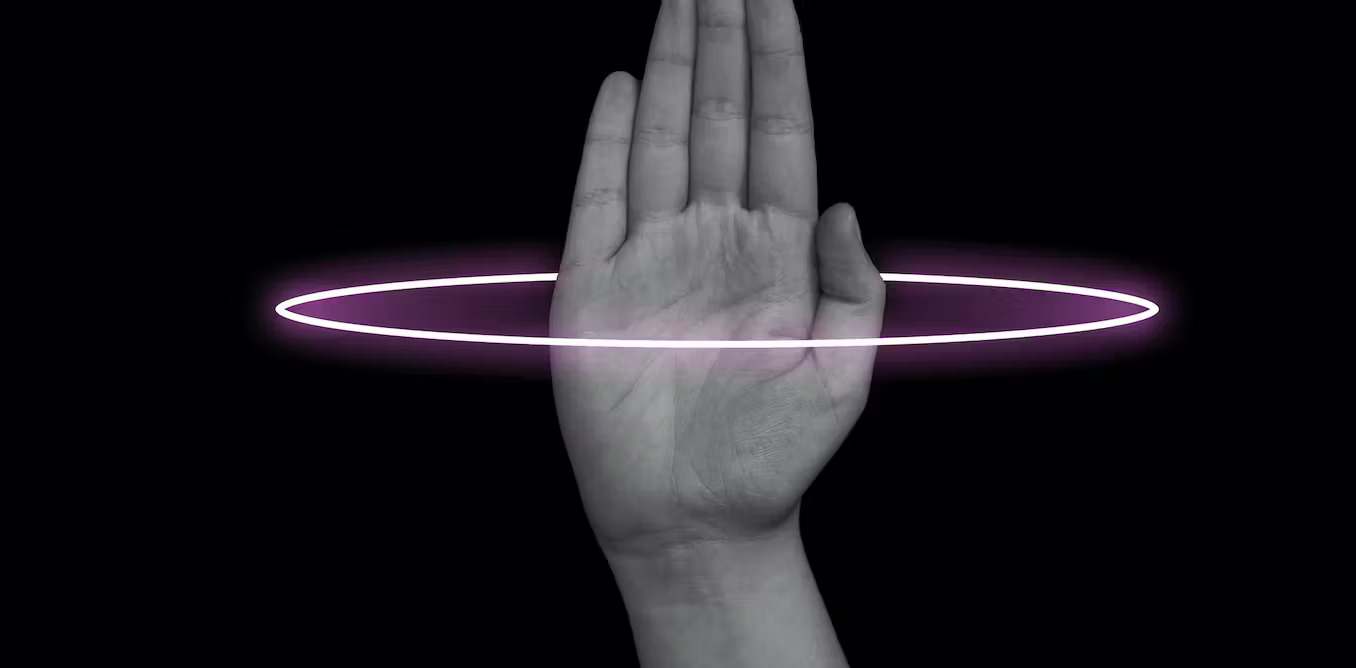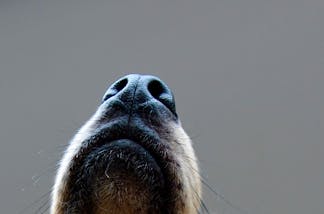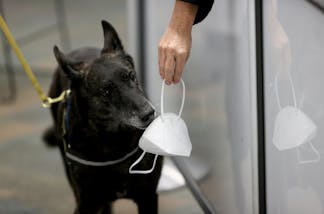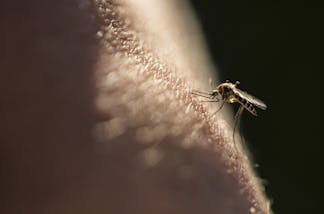 The scent emitted from your hands could offer clues about who you are. Siro Rodenas Cortés/Moment via Getty Images
The scent emitted from your hands could offer clues about who you are. Siro Rodenas Cortés/Moment via Getty Images–
![]() Postdoctoral Researcher, Lawrence Livermore National Laboratory
Postdoctoral Researcher, Lawrence Livermore National Laboratory
–
Published: 2023 Sep 20
–
From the aroma of fresh-cut grass to the smell of a loved one, you encounter scents in every part of your life. Not only are you constantly surrounded by odor, you’re also producing it. And it is so distinctive that it can be used to tell you apart from everyone around you.
Your scent is a complex product influenced by many factors, including your genetics. Researchers believe that a particular group of genes, the major histocompatibility complex, play a large role in scent production. These genes are involved in the body’s immune response and are believed to influence body odor by encoding the production of specific proteins and chemicals.
But your scent isn’t fixed once your body produces it. As sweat, oils and other secretions make it to the surface of your skin, microbes break down and transform these compounds, changing and adding to the odors that make up your scent. This scent medley emanates from your body and settles into the environments around you. And it can be used to track, locate or identify a particular person, as well as distinguish between healthy and unhealthy people.
We are researchers who specialize in studying human scent through the detection and characterization of gaseous chemicals called volatile organic compounds. These gases can relay an abundance of information for both forensic researchers and health care providers.
–
Science of body odor
When you are near another person, you can feel their body heat without touching them. You may even be able to smell them without getting very close. The natural warmth of the human body creates a temperature differential with the air around it. You warm up the air nearest to you, while air that’s farther away remains cool, creating warm currents of air that surround your body.
Researchers believe that this plume of air helps disperse your scent by pushing the millions of skin cells you shed over the course of a day off your body and into the environment. These skin cells act as boats or rafts carrying glandular secretions and your resident microbes – a combination of ingredients that emit your scent – and depositing them in your surroundings.
Your scent is composed of the volatile organic compounds present in the gases emitted from your skin. These gases are the combination of sweat, oils and trace elements exuded from the glands in your skin. The primary components of your odor depend on internal factors such as your race, ethnicity, biological sex and other traits. Secondary components waver based on factors like stress, diet and illness. And tertiary components from external sources like perfumes and soaps build on top of your distinguishable odor profile.
Identity of scent
With so many factors influencing the scent of any given person, your body odor can be used as an identifying feature. Scent detection canines searching for a suspect can look past all the other odors they encounter to follow a scent trail left behind by the person they are pursuing. This practice relies on the assumption that each person’s scent is distinct enough that it can be distinguished from other people’s.
Researchers have been studying the discriminating potential of human scent for over three decades. A 1988 experiment demonstrated that a dog could distinguish identical twins living apart and exposed to different environmental conditions by their scent alone. This is a feat that could not be accomplished using DNA evidence, as identical twins share the same genetic code.
The field of human scent analysis has expanded over the years to further study the composition of human scent and how it can be used as a form of forensic evidence. Researchers have seen differences in human odor composition that can be classified based on sex, gender, race and ethnicity. Our research team’s 2017 study of 105 participants found that specific combinations of 15 volatile organic compounds collected from people’s hands could distinguish between race and ethnicity with an accuracy of 72% for whites, 82% for East Asians and 67% for Hispanics. Based on a combination of 13 compounds, participants could be distinguished as male or female with an overall 80% accuracy.
–
Researchers are also producing models to predict the characteristics of a person based on their scent. From a sample pool of 30 women and 30 men, our team built a machine learning model that could predict a person’s biological sex with 96% accuracy based on hand odor.
Scent of health
Odor research continues to provide insights into illnesses. Well-known examples of using scent in medical assessments include seizure and diabetic alert canines. These dogs can give their handlers time to prepare for an impending seizure or notify them when they need to adjust their blood glucose levels.
While these canines often work with a single patient known to have a condition that requires close monitoring, medical detection dogs can also indicate whether someone is ill. For example, researchers have shown that dogs can be trained to detect cancer in people. Canines have also been trained to detect COVID-19 infections at a 90% accuracy rate.
Similarly, our research team found that a laboratory analysis of hand odor samples could discriminate between people who are COVID-19 positive or negative with 75% accuracy.
Forensics of scent
Human scent offers a noninvasive method to collect samples. While direct contact with a surface like touching a doorknob or wearing a sweater provides a clear route for your scent to transfer to that surface, simply standing still will also transfer your odor into the surrounding area.
Although human scent has the potential to be a critical form of forensic evidence, it is still a developing field. Imagine a law enforcement officer collecting a scent sample from a crime scene in hopes that it may match with a suspect.
Further research into human scent analysis can help fill the gaps in our understanding of the individuality of human scent and how to apply this information in forensic and biomedical labs.
–
- Forensic science
- Identification
- Dogs
- Forensics
- Scents
- Odor
- Body odor
- COVID-19
- Volatile organic compounds
–
Authors Disclosure Statement
Dr. Vidia Gokool formerly of Florida International University, is currently an employee of the Department of Energy. The writing and preparation of this work was in part performed under the auspices of the U.S. Department of Energy by Lawrence Livermore National Laboratory under Contract DE-AC52-07NA27344.
Chantrell Frazier does not work for, consult, own shares in or receive funding from any company or organization that would benefit from this article, and has disclosed no relevant affiliations beyond her academic appointment.
Partners

Florida International University provides funding as a member of The Conversation US.
Republish our articles for free, online or in print, under a Creative Commons license.
–
Helping you understand the news
When complicated stories are in the news, The Conversation is especially relevant. Our editors specialize in finding experts and helping them write articles explaining the key concepts clearly, but always accurately, based on years or decades of study. The future of AI is a perfect example of this. There’s been a lot of facile analysis in the media from pundits who either position it as the greatest advancement of all time or posit horror stories about it running amok.
But readers of The Conversation have benefited from thoughtful analysis and research from dozens of experts, from disciplines ranging from information retrieval to ethics, law, education and art. We’ve compiled some of our best explanatory journalism into a magazine-style e-book, “A new age for AI: How it works and why it matters,” which we’ll give to you free with any gift to support our work, as well as an e-book with some of our most popular stories of 2023 so far.
It’s our way of thanking the readers who make what we do possible, and it will enable us to continue to explore this rapidly evolving field and provide this trustworthy journalism for free to readers around the world. Thank you.
I’d like to donate
Brittney Price 
Data Specialist
–
–
Want to write?
Write an article and join a growing community of more than 170,900 academics and researchers from 4,739 institutions.












